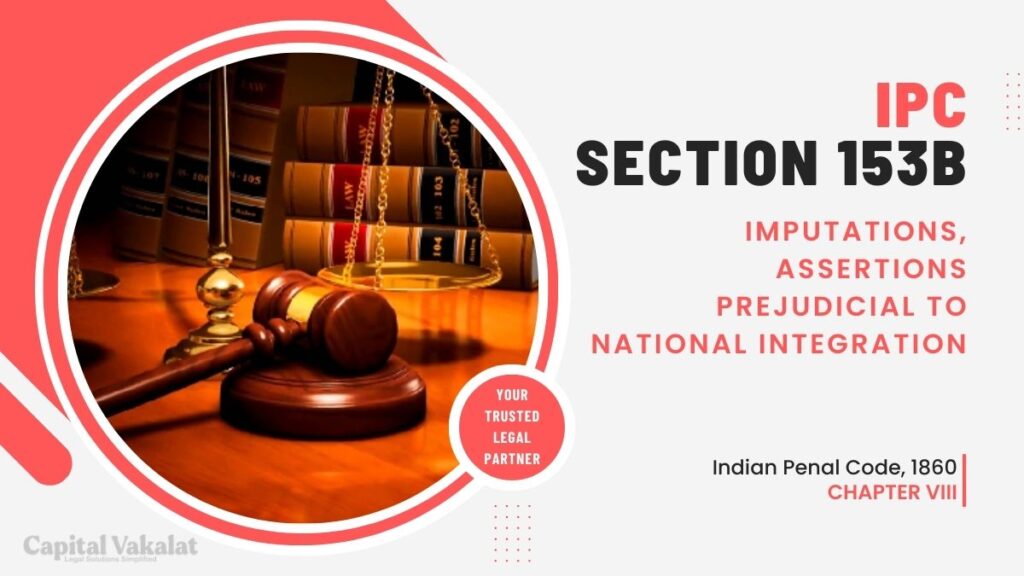In a diverse and pluralistic society like India, maintaining national integration is of paramount importance. Section 153B of the Indian Penal Code (IPC) deals with imputations, assertions, or speeches that are prejudicial to national integration. This article aims to provide a comprehensive understanding of Section 153B IPC, its historical context, the elements of the offense, the punishment prescribed, and its contemporary relevance.

This section is a legal provision in India that aims to prevent and address actions or statements that can harm the unity and integrity of the nation. Here is an explanation in English:
Introduction
Section 153B IPC is an integral part of the Indian legal framework that seeks to curb hate speech and actions that could threaten the unity and integrity of the nation. It is crucial in a country with a multitude of languages, religions, and cultures coexisting.
Section 153B of the Indian Penal Code (IPC) is a legal provision that addresses actions and assertions that are harmful to the national integration and unity of India. It deals with situations where individuals make imputations, statements, or assertions that can potentially disrupt the peaceful coexistence of various communities, castes, religions, or linguistic groups within the country.
The primary objective of this provision is to prevent any act or communication that promotes enmity or hatred among different sections of the Indian society and threatens the nation’s harmonious existence. Section 153B aims to safeguard national integration and communal harmony by making such actions punishable under Indian law.
This provision seeks to deter individuals from making baseless allegations or spreading false information that can lead to tension, conflict, or violence among different groups in India. Violation of this section can lead to legal consequences, including imprisonment and fines, depending on the severity of the offense.
Understanding Section 153B IPC
This section makes it an offense to make imputations or assertions with the intent to promote disharmony, enmity, or feelings of hatred between different groups. It criminalizes acts that threaten national integration and communal harmony.
Historical Context
The IPC was enacted in 1860 during British colonial rule. Section 153B was later inserted to address issues arising from communal and sectarian conflicts.
Elements of Section 153B IPC
For an offense under this section to be established, the prosecution must prove that the accused intentionally promoted disharmony or feelings of enmity and hatred. Mere criticism of government actions is not sufficient to invoke this section.
Punishment for Offenses under Section 153B IPC
If convicted under Section 153B, the accused can face imprisonment for up to three years or a fine, or both. The severity of the punishment underscores the gravity of the offense.
Prejudice to National Integration
Acts falling under Section 153B can severely prejudice the peaceful coexistence of different groups in society. It undermines the principles of unity in diversity that India cherishes.
Important Legal Cases
Several legal cases have highlighted the significance of Section 153B IPC. Notable cases include those related to hate speeches, communal violence, and the spread of communal disharmony.
Contemporary Relevance
In today’s digital age, the impact of words and messages can spread rapidly. Section 153B is more relevant than ever, as hate speech on social media platforms can have far-reaching consequences.
Role of Media
The media plays a crucial role in shaping public opinion. Section 153B also applies to media houses and journalists who may publish content that promotes enmity or hatred.
Significance of Section 153B IPC
This section acts as a deterrent to individuals and groups promoting hate speech and divisive ideologies. It aims to create a safe environment for all citizens.
Balancing Freedom of Speech
While protecting national integration is vital, it is essential to strike a balance with the freedom of speech, a fundamental right. The Indian legal system endeavors to protect both.
Recent Amendments
The IPC has undergone various amendments to adapt to modern challenges. Recent amendments have expanded the scope of Section 153B to cover online content.
Criticisms and Debates
There are debates about the subjectivity in interpreting what constitutes an offense under Section 153B. Some argue that it can be misused to suppress legitimate dissent.
Conclusion
In conclusion, Section 153B IPC plays a crucial role in safeguarding the national integration of India. It reflects the nation’s commitment to unity and diversity while ensuring that hate speech and actions do not go unpunished. In summary, Section 153B of the IPC is a legal safeguard designed to promote national unity, peace, and harmony by discouraging actions and statements that can potentially undermine the social fabric of the nation.
This comprehensive article provides valuable insights into Section 153B IPC, its historical context, and its contemporary relevance. It emphasizes the importance of striking a balance between protecting national integration and preserving the freedom of speech, a fundamental right in any democratic society.
Frequently Asked Questions
Can criticism of government policies be covered under Section 153B?
No, mere criticism of government policies is not an offense under Section 153B. It requires an intention to promote hatred or enmity.
What is the punishment for offenses under Section 153B IPC?
Offenders can face imprisonment of up to three years, a fine, or both.
How does Section 153B IPC relate to contemporary issues like hate speech on social media?
Section 153B has been adapted to address modern challenges, including hate speech on digital platforms.
Is there a way to balance freedom of speech and the prevention of hate speech under Section 153B IPC?
Yes, the Indian legal system strives to strike a balance between protecting national integration and upholding freedom of speech, ensuring that legitimate dissent is not stifled.